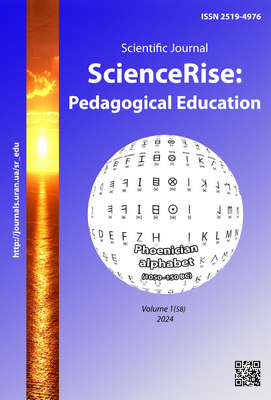Social larping as an author's method of forming the social competence of children with complex developmental disorders
DOI:
https://doi.org/10.15587/2519-4984.2024.298179Keywords:
social competence, children with complex developmental disorders, social larpingAbstract
The article presents the author's own practical experience and description of experimental work with children with complex disorders (autism, ADHD, intellectual disability, Down syndrome, childhood schizophrenia, cerebral palsy). The author has created his own method of forming the social competence of children with complex developmental disorders, implemented as part of an experiment within a rehabilitation institution. The essence and advantages of social larping are defined. The scientific studies related to the research topic are briefly reviewed. The method of forming social competence for autistic children - Creative drama - is analysed. A comparative analysis of the method of "live" game LARP and Creative drama is carried out. The concept of "social larping" is defined for the first time. The criteria and indicators of the level of formation of the social competence of children with complex developmental disorders are outlined (cognitive: knowledge of ways of behaviour, rights and responsibilities; basic ideas and knowledge to meet their own needs; knowledge of ways of social interaction; emotional and motivational: understanding of emotions, self-control skills (self-esteem), social values; behavioural: social interaction, orientation in social roles, social skills). The descriptive characteristics of the levels of formation of the social competence of children with complex developmental disorders in accordance with the above criteria are provided.
The importance of introducing social larping as an author's method of forming the social competence of children with complex developmental disorders within the correctional and developmental work of rehabilitation institutions is proved. The impact of social larping on improving the interaction between children with complex developmental disorders within a mini-group, catching up with the child's own social experience in a rehabilitation centre is analysed.
The conclusions and suggestions demonstrate the essence and advantages of social larping as a method of forming the social competence of children with SCD, as well as the effectiveness of its implementation
References
- Demchenko, O. (2012). Formuvannia sotsialnoi kompetentnosti ditei z osoblyvymy potrebamy u protsesi vykorystannia vykhovnykh sytuatsii. Naukovo-pedahohichni zasady formuvannia sotsialnykh kompetentsii uchniv z osoblyvymy potrebamy yak skladovoi navchalno-reabilitatsiinoho protsesu. Vol. 1. Zaporizhzhia: Vydavnytstvo Khortytskoho natsionalno-reabilitatsiinoho bahatoprofilnoho tsentru, 416–423. Available at: http://surl.li/psrfa
- Soares, E. E., Bausback, K., Beard, C. L., Higinbotham, M., Bunge, E. L., Gengoux, G. W. (2020). Social Skills Training for Autism Spectrum Disorder: a Meta-analysis of In-person and Technological Interventions. Journal of Technology in Behavioral Science, 6 (1), 166–180. https://doi.org/10.1007/s41347-020-00177-0
- Learning Through Play with Cerebral Palsy. Physiopedia. Available at: http://surl.li/ptonl
- Reid, D. T. (2002). Benefits of a virtual play rehabilitation environment for children with cerebral palsy on perceptions of self-efficacy: a pilot study. Pediatric Rehabilitation, 5 (3), 141–148. https://doi.org/10.1080/1363849021000039344
- Sulaiman, N. H., Ghazali, M. (2015). Learning through playing for children with cerebral palsy. Jurnal Teknologi, 78 (2-2). https://doi.org/10.11113/jt.v78.6930
- Osoblyvosti rozvytku. Stud. Available at: https://stud.com.ua/78675/psihologiya/osoblivosti_rozvitku Last accessed: 04.11.2023
- Maenner, M. J., Shaw, K. A., Bakian, A. V., Bilder, D. A., Durkin, M. S. Esler, A. (2021). Prevalence and Characteristics of Autism Spectrum Disorder Among Children Aged 8 Years – Autism and Developmental Disabilities Monitoring Network, 11 Sites, United States, 2018. Surveillance Summaries, 70 (11), 1–16. Available at: http://surl.li/gtqsd Last accessed: 02.05.2023
- Kubata, N. P., Aizenbart, M. M. (2018). Hra yak zasib formuvannia kompetentsii u ditei starshoho doshkilnoho viku. Young Scientist, 5 (57), 55.Available at: https://molodyivchenyi.ua/index.php/journal/article/view/4455/4382
- Moroz, S. V. (2019). Rol hry v sotsializatsii dytyny doshkilnoho viku. Doshkilna osvita u suchasnomu sotsiokulturnomu prostori, 3, 130–134.Available at: http://dspace.pnpu.edu.ua/bitstream/123456789/15519/1/29.pdf Last accessed: 04.11.2023
- Ms. Snyder's Creative Drama Class. Available at: http://ssnyderdrama.weebly.com/ Last accessed: 27.10.2022
- Benefits of Creative Drama. Character Kids. Available at: https://www.characterkidsdrama.com/benefits Last accessed: 02.11.2023
Downloads
Published
How to Cite
Issue
Section
License
Copyright (c) 2024 Sumenko Tеtiana

This work is licensed under a Creative Commons Attribution 4.0 International License.
Our journal abides by the Creative Commons CC BY copyright rights and permissions for open access journals.
Authors, who are published in this journal, agree to the following conditions:
1. The authors reserve the right to authorship of the work and pass the first publication right of this work to the journal under the terms of a Creative Commons CC BY, which allows others to freely distribute the published research with the obligatory reference to the authors of the original work and the first publication of the work in this journal.
2. The authors have the right to conclude separate supplement agreements that relate to non-exclusive work distribution in the form in which it has been published by the journal (for example, to upload the work to the online storage of the journal or publish it as part of a monograph), provided that the reference to the first publication of the work in this journal is included.







